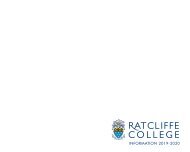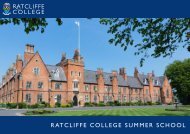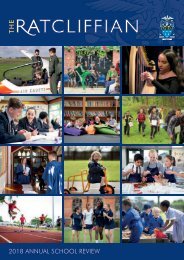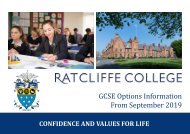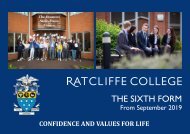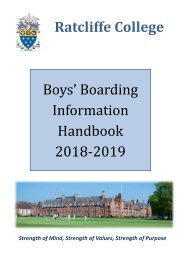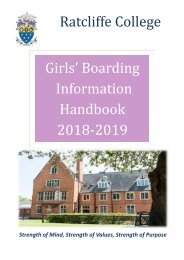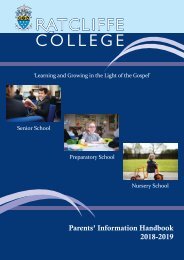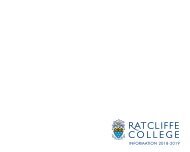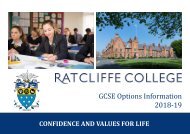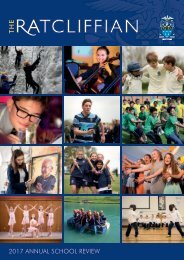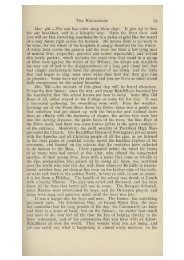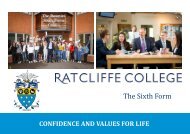Ratcliffian 2016 (LOWRES)
You also want an ePaper? Increase the reach of your titles
YUMPU automatically turns print PDFs into web optimized ePapers that Google loves.
FOOD TECHNOLOGY<br />
FutureChef <strong>2016</strong> contestants<br />
Emily Sellicks<br />
GEOGRAPHY<br />
Yasmina celebrating her success<br />
Yasmina Lock final stage FutureChef <strong>2016</strong><br />
Olivia Gilchrist Christmas food competition<br />
Geography<br />
The Geography Department celebrated a very strong set of A2 and AS results<br />
last summer with 100% of students at ‘A’ Level achieving A*-C grades and a<br />
record 79% of students at grade B or better.<br />
Yasmina Lock Christmas food competition<br />
Lottie Warburton Christmas food competition<br />
Cooking Club<br />
FOOD TECHNOLOGY<br />
The year started on a positive note, with excellent examination<br />
results at all levels. At A2, the pass rate was 100%, with 67%<br />
of students gaining A and B grade.<br />
At AS level, the pass rate was 100%, placing Ratcliffe College<br />
in the top 10% of schools teaching Food Technology in the<br />
country. At GCSE, there was an 82% A to C pass rate, with<br />
63% achieving A and B grades.<br />
This academic year has flown by; with shorter lessons and<br />
having all students in KS3 for the whole of the year, it has<br />
been an exciting and busy time. The highlight of the year<br />
was Yasmina Lock (Year 8) reaching the final of the national<br />
FutureChef Competition that took place in London in March.<br />
Yasmina was one of over 8000 students to reach this stage,<br />
a remarkable achievement at such a young age. Her dishes<br />
were pan-seared fillet of salmon with lemon beurre blanc<br />
sauce, pomme puree with sundried tomatoes, buttered stem<br />
broccoli and sauted oyster mushrooms with chorizo, followed<br />
by almond crunch with a raspberry and vanilla cream in a<br />
dark chocolate sphere and hot caramel sauce. She achieved<br />
some excellent feedback.<br />
The annual Christmas food competition took place at the<br />
beginning of December. We are always amazed by the<br />
high skill and sheer professionalism of the students; the<br />
products they make would not be out of place on The Great<br />
British Bake Off. Each year group had their own individual<br />
competition and received points for their house and<br />
recognition in a Headmaster’s assembly.<br />
A batch of scones was the product chosen in the Ratcliffe<br />
Bake Off this year, and Isabella Mulvihill was the winner.<br />
Each student was given a recipe, identical ingredients and<br />
an hour to complete their product.<br />
Next year, we will introduce the new GCSE syllabus for<br />
Food Preparation and Nutrition so we are looking forward<br />
to and excited about a new chapter in our ever-changing<br />
subject name.<br />
Mrs K Burton<br />
Head of Food Technology<br />
The AS results were very encouraging with strong value<br />
added and all department targets met. GCSE results were<br />
also very strong with two thirds of students achieving a B<br />
grade or better.<br />
The Year 12 students have made an effective start to their A2<br />
course. Study of the Urban Environments topic was supported<br />
by a series of short field visits for the first time this year. Within<br />
lesson time, students visited various locations in Leicester with<br />
a different focus for each visit. For example, they visited the<br />
Space Centre complex and the ‘Cultural Quarter’, centred<br />
around the Curve Theatre, to focus on urban regeneration.<br />
These field visits provided a valuable contextual layer to their<br />
urban studies, and the department hopes to build on such<br />
local field visits in future years. Year 13 students continued to<br />
develop their fieldwork portfolio for the F764 Geographical<br />
Investigation unit with a visit to Sileby to investigate the<br />
extent it fitted the profile of a metropolitan village. They also<br />
conducted on-site investigations and independent studies,<br />
including comparing the climate at Ratcliffe College to that of<br />
the heart of Leicester. Mr Dziemianko has worked tirelessly in<br />
supporting the students develop their appreciation of how to<br />
gather and process data.<br />
Year 10 attained encouraging results in their end of year<br />
examination and we look forward to working with them next<br />
year as they focus on completion of their GCSE course. The<br />
Year 10 students have completed their Controlled Assessment<br />
task, worth 25% of their final GCSE grade, and are the first<br />
cohort to finish this element of the course before the end of<br />
the summer term. The task is based on data collected by<br />
the students; to this end the Year 10 cohort visited Leicester<br />
shortly after Easter to investigate to what extent the Central<br />
Business District (CBD) of the city fitted with theory and models<br />
proposed by the Royal Geographical Society.<br />
Despite challenging weather conditions at the start of the<br />
day, students approached data collection with enthusiasm,<br />
completing land use maps for a large proportion of the CBD,<br />
along with building height transects, pedestrian counts and<br />
shopping quality surveys. Backed up with further secondary<br />
research, the students have worked diligently in following up<br />
the fieldwork with data presentation and analysis.<br />
Years 7-9 have enjoyed studying a greater breadth of topics this<br />
year as part of the Key Stage 3 syllabus. Reforms have and will<br />
continue to be implemented to help prepare students for the<br />
new GCSE specification, and the topics covered in Years 7-9<br />
now reflect a wider range of human, physical, environmental<br />
and place-based learning, in addition to focusing on the<br />
development of geographical skills. On-going assessments and<br />
lessons focused on the development of higher order thinking<br />
skills are aimed at creating well-rounded geographers. The<br />
Department has run drop-in clinics at lunchtimes where staff are<br />
available to discuss all matters geographical with students, or<br />
support them with work being done in lessons. There were some<br />
new topics for students in Years 8 and 9, with Year 8 students<br />
learning about the geography of India and world issues such as<br />
food security and climate change. A particular highlight for the<br />
Year 8 students was watching the extremely thought-provoking<br />
film, The Age of Stupid. They reflected on how it made them feel<br />
about our material, throwaway society and how the implications<br />
of this will be felt by future generations. Year 9 students studied<br />
a new environmental-themed unit, which included the study of<br />
different ecosystems and climates. There have also been some<br />
excellent projects completed by students across Years 7-9;<br />
particular mention must go to the Year 7 students for their Local<br />
Area projects and Year 8 for their Travel a Country projects.<br />
Mr M Lambert<br />
Head of Geography<br />
48<br />
49





